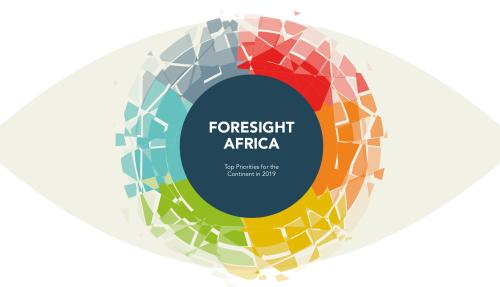Below is a viewpoint from Chapter 6 of the Foresight Africa 2019 report, which explores six overarching themes on the triumphs of the past years as well as strategies to tackle the remaining obstacles for Africa. Read the full chapter on boosting trade and investment.
On March 21, 2018, in Kigali, Rwanda, Africa took the giant step of creating a large and integrated market by establishing the African Continental Free Trade Area (AfCFTA). As of November 2018, the agreement had 49 signatures and 12 ratifications (Chad, Côte D’Ivoire, eSwatini, Ghana, Guinea, Kenya, Mali, Niger, Rwanda, Sierra Leone, South Africa, and Uganda). Although a minimum of 22 ratifications are required for the agreement to enter into force, advocacy continues to push to have all African Union member-states onboard so that we can have a truly integrated market that completely removes the historical pattern of smallness, isolation, and fragmentation of our economies and the consequential lack of competitiveness. The stakeholders for the agreement are wide, including women, youth, private sector, civil society, academia, parliamentarians, and cooperating partners. A business guide and handbook to the AfCFTA have been published to assist in advocacy.
Preparatory work to make the market operate continues in areas like rules of origin, liberalization of trade in goods and services, and establishment of a digital payments and settlements systems. We are also developing regional value chains to supply the market and competitively link Africa to global value chains.
The most critical challenge we face is to bring the AfCFTA into operation in 2019 and double intra-African trade by 2022 once tariff and non-tariff barriers are removed. We also face the challenge of bringing about win-win outcomes given that the AfCFTA will be a diverse membership of least-developed, landlocked, small-island, and lower and upper-middle countries, as well as countries in conflict.
The African Union is taking action to break down barriers and improve the flow of goods, people, and capital.
There is the added political challenge. Some of our interlocutors who were skeptical that we would succeed in negotiating the agreement are now saying we lack the collective capacity to implement it. Strong political and popular will, focus, and resilience to generate tangible outcomes will enable us to meet these and other challenges.
Mandela once said, “It always seems impossible until it is done.” In that spirit, we will make the AfCFTA work.
Some of our plans for the implementation of the AfCFTA are as follows. Member states will formulate and implement national AfCFTA strategies. At the regional level, the African Union is taking action to break down barriers and improve the flow of goods, people, and capital. For instance, we are implementing the World Trade Organization’s Trade Facilitation Agreement through our Trade Facilitation Strategy to make Africa a better global competitor. Further, in January 2018, the AU launched the Single African Air Transport Market and opened for signature the Protocol to the Treaty Establishing the African Economic Community Relating to Free Movement of Persons, and Right of Residence and Right of Establishment. Work is underway to conclude by 2020 the negotiation of Protocols on Investment, Competition and Intellectual Property Rights. Through these, the AfCFTA is already moving toward an internal market free of physical, technical, or fiscal barriers.
What is more, the AfCFTA is on a historical fast track. We expect the AfCTA to take effect faster than the five-year average for AU legal instruments to enter into force. With that, states will benefit sooner from the pooled and expanded sovereignty. We are confident that this landmark agreement will deliver decent livelihoods for all Africans in line with Agenda 2063.





Commentary
Creating one market under the African Free Trade Area: Progress and challenges
January 16, 2019